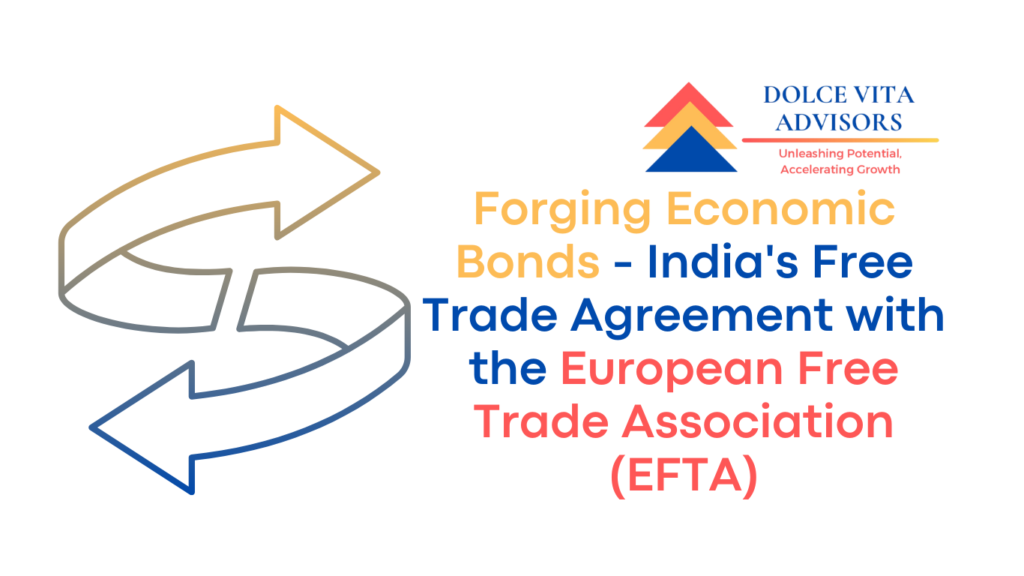
Insights by: Sumit Kochar and Neha Jha
India’s recent trade agreement with the European Free Trade Association (EFTA) marks a significant step towards enhancing economic cooperation and fostering mutually beneficial trade relations. The agreement, aimed at promoting trade and economic partnership between India and the EFTA member states. The EFTA today includes four (4) non-European Union (EU) countries — Iceland, Liechtenstein, Norway, and Switzerland.
Prime Minister Narendra Modi has lauded this development as a “watershed moment,” which highlights the commitment to shared prosperity and the fortification of a more inclusive partnership between the two entities.
Signed on March 10, 2024, the Trade and Economic Partnership Agreement (TEPA) between India and the EFTA—comprising Switzerland, Norway, Iceland, and Liechtenstein—marks a substantial milestone in their bilateral relations. Described as “innovative and well-balanced,” the agreement reflects the developmental aspirations of both parties and their joint dedication to open, equitable, and fair-trade practices.
As an integral component of this agreement, the EFTA has committed to promoting investments aimed at augmenting foreign direct investments in India by USD 100 billion over the subsequent 15 years, thereby facilitating the creation of 1 million direct jobs in India through such investments.
Prime Minister Narendra Modi has commended the TEPA as one of the most groundbreaking free trade agreements ever concluded between India and the EFTA nations. He has emphasized the unwavering dedication to shared prosperity, affirming a collective drive towards a more robust, inclusive partnership in alignment with the aspirations of their respective populations.
Despite the structural disparities between the economies of India and the EFTA nations, Prime Minister Narendra Modi has deepened the complementary strengths that offer mutual benefits for all involved parties. He has highlighted the emergence of significant trading and investment opportunities catalyzed by the agreement, indicative of a newfound level of trust and ambition in their relationship.
Moreover, Prime Minister Narendra Modi has drawn attention to India’s remarkable economic growth over the past decade, with aspirations to elevate the nation to the status of the world’s third-largest economy. He attributes this growth to wide-ranging reforms that have enhanced the ease of doing business, propelling India to new heights across various sectors.
Further, Prime Minister Narendra Modi has expressed confidence in the collaborative prospects spanning diverse sectors, leveraging the global leadership of EFTA countries in innovation and research and development. He has pledged India’s full support to the EFTA countries in achieving their committed targets and beyond, fostering industry and business collaborations for mutual prosperity.
Key Components of TEPA:
- Trade Facilitation: The agreement prioritizes the simplification and harmonization of trade procedures between India and the EFTA member states. By reducing trade barriers, including tariffs and non-tariff measures, the agreement aims to facilitate the smooth movement of goods and services across borders. This streamlined trade process will enhance efficiency, reduce transaction costs, and promote greater market access for businesses on both sides.
- Investment Promotion: A key focus of the agreement is to create a conducive environment for investment promotion and protection. By providing greater certainty and transparency for investors, the agreement aims to boost investor confidence and attract foreign direct investment (FDI) flows between India and the EFTA countries. Provisions related to investment protection, dispute resolution, and intellectual property rights (IPR) safeguard the interests of investors and encourage long-term capital inflows.
- Market Access: The agreement seeks to expand market access opportunities for Indian and EFTA businesses in each other’s markets. By eliminating or reducing trade barriers, such as tariffs and quotas, the agreement enables exporters and importers to capitalize on new market opportunities and increase trade volumes. This enhanced market access promotes economic diversification, stimulates competition, and fosters innovation across various sectors, contributing to overall economic growth.
- Intellectual Property Rights (IPR): Recognizing the importance of intellectual property protection in fostering innovation and technological advancement, the agreement includes provisions to safeguard intellectual property rights (IPR) for businesses and innovators. By establishing robust mechanisms for IPR enforcement and protection, the agreement encourages investment in research and development (R&D) and promotes the dissemination of knowledge and technology transfer between India and the EFTA countries.
- Sustainable Development: In line with global sustainability goals, the agreement emphasizes the importance of sustainable development and responsible business practices. Commitments to environmental protection, social responsibility, and inclusive growth ensure that economic cooperation between India and the EFTA countries is conducted in a manner that promotes environmental conservation, social equity, and inclusive development. By integrating sustainable development principles into trade and investment policies, the agreement aims to achieve long-term economic prosperity while safeguarding the interests of present and future generations.
Conclusion
Prime Minister Narendra Modi, in his visionary leadership, has hailed the TEPA as a monumental milestone in the journey towards a more prosperous future for India and the EFTA countries. The signing of this agreement not only represents a historic achievement in bilateral relations but also signifies a new paradigm of international economic cooperation. The commitment and foresight demonstrated by Prime Minister Narendra Modi in fostering this agreement highlight his unwavering dedication to advancing India’s economic interests and promoting global collaboration.
The India-EFTA Trade Agreement symbolizes a significant leap forward in strengthening economic ties and fostering collaboration between India and the European Free Trade Association (EFTA) member states. By streamlining trade procedures, enhancing market access, and promoting investment facilitation, the agreement lays a robust foundation for bilateral trade and investment flows.
As India and the EFTA member states embark on the implementation of this agreement, it is poised to yield substantial benefits in terms of economic growth, job creation, and shared prosperity. Through leveraging each other’s strengths and complementarities, India and the EFTA countries can deepen economic integration, spur innovation, and unlock new avenues for collaboration. Ultimately, the India-EFTA Trade Agreement sets the stage for a more interconnected and prosperous future for all parties involved, a testament to Prime Minister Narendra Modi’s visionary leadership and commitment to India’s economic advancement.

